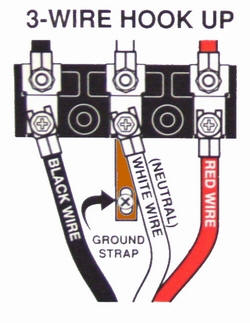

You call a couple of electricians, get some quotes, and have them wire it all up in your garage.

#DRYER PLUG INSTALL INSTALL#
If you’ve got great income and always have an extra $1,000–$5,000 ready to go for an EV charger install without wiping out a good chunk (or all of) your savings, then, yes, one can simply set up EV charging at home. Factors such as the age of the home, the electric panel capacity, the type of installation, and where the panel location is relative to the car charger all play a role in the cost. Ultimately, the cost to install a home charging station varies on a number of factors. Also subjective to home’s electrical capacity.ĭepends on the local market and the time spent by electricians. ItemĬost varies on charger features such as WiFi connectivity or maximum amperage.Įlectrical Materials (outlets, wiring, breakers, panels, etc.)Ĭost varies depending on charger location relative to the electrical panel. Breakdown of costs for installing home car charging. Expect to pay another $1,000 to $2,000 for that if you’re lucky.
#DRYER PLUG INSTALL UPGRADE#
On top of that, adding a new 50-amp, 240-volt outlet might require that you upgrade the house’s main electrical panel and wiring to the pole. Do this somewhere with a high cost of living, and it’s even worse. I definitely wouldn’t recommend trying to save a few bucks the way I did unless your life insurance is good and you aren’t too happy with life.Īdding in the cost of doing this the right way (by hiring a licensed electrician), the cost of putting in your EV charging station can easily go over $2000, even in smaller cities. On one Tesla charging station installation, I managed to cut into a live wire when I didn’t turn the right breaker off. In college, I helped wire up several houses during the summer to get through school, and even with that experience, I make the occasional mistake. If you don’t know what you’re doing with house wiring, it’s probably not a great idea to try to do this alone based on YouTube videos. If you need to run a wire from the breaker panel, up into the attic, across a house, and back down into the garage wall, that could cost you $200–500 - and, again, that’s just the wire! Add in a NEMA 14-50 outlet, a breaker, and an EVSE unit, and even a DIY job can easily go over $1000. You need wiring from the main breaker panel to the garage or outside parking space, and the wiring alone can cost $3-5 per foot. The installation of a new 50 amp, 240-volt circuit is no walk in the park. Like Boromir in Lord of the Rings, I sometimes have to remind everyone that “one does not simply charge at home.”

“Just charge it at home!” or “Don’t worry about charging stations, 90% of charging simply happens at home!” they say.
#DRYER PLUG INSTALL PROFESSIONAL#
Professional EV Charger Installation At Home Isn’t Cheap Lastly, I’ll cover an innovative solution to installing a charging station using an existing 240-volt outlet. Second, I’ll mention all the unsafe ways people try to charge at home. I’m going to go through some common bad advice I see out there and cover one good way to safely charge on a budget.įirst, I’ll be touching on how professional EV charger installations at home aren’t always the cheapest, breaking down all the components needed to install a home charging station. Home EV charging is one of the things I see EV advocates get wrong more often than the others.

My hat (if I ever wore one) is off to you all! On occasion, though, we get things wrong when trying to inform the public. And they get things right most of the time. For example, by helping you find the right EV charging station, they may help you with your overall car charging and ownership experience. They’re providing a valuable service to the community. On social media, there are a lot of awesome electric vehicle (EV) fans who help out new EV owners and potential buyers. Read on as we outline the safest way to save time, money, and hassle for home charging. Here we have a guide for what it costs to install electric vehicle (EV) charging stations at home, including the process of panel upgrades, permits, and 240-volt circuits.


 0 kommentar(er)
0 kommentar(er)
